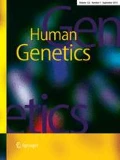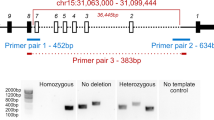Abstract.
Incomplete X-linked congenital stationary night blindness (CSNB) is a recessive, non-progressive eye disorder characterized by abnormal electroretinogram and psychophysical testing and can include impaired night vision, decreased visual acuity, myopia, nystagmus, and strabismus. Including the 20 families previously reported (Bech-Hansen et al. 1998b), we have now analyzed patients from a total of 36 families with incomplete CSNB and identified 20 different mutations in the calcium channel gene CACNA1F. Three of the mutations account for incomplete CSNB in two or more families, and a founder effect is clearly demonstrable for one of these mutations. Of the 20 mutations identified, 14 (70%) are predicted to cause premature protein truncation and six (30%) to cause amino acid substitutions or deletions at conserved positions in the α1F protein. In characterizing transcripts of CACNA1F we have identified several splice variants and defined a prototypical sequence based on the location of mutations in splice variants and comparison with the mouse orthologue, Cacna1f.
Similar content being viewed by others
Author information
Authors and Affiliations
Additional information
Electronic Publication
Rights and permissions
About this article
Cite this article
Boycott, K., Maybaum, T., Naylor, M. et al. A summary of 20 CACNA1F mutations identified in 36 families with incomplete X-linked congenital stationary night blindness, and characterization of splice variants. Hum Genet 108, 91–97 (2001). https://doi.org/10.1007/s004390100461
Received:
Accepted:
Issue Date:
DOI: https://doi.org/10.1007/s004390100461




